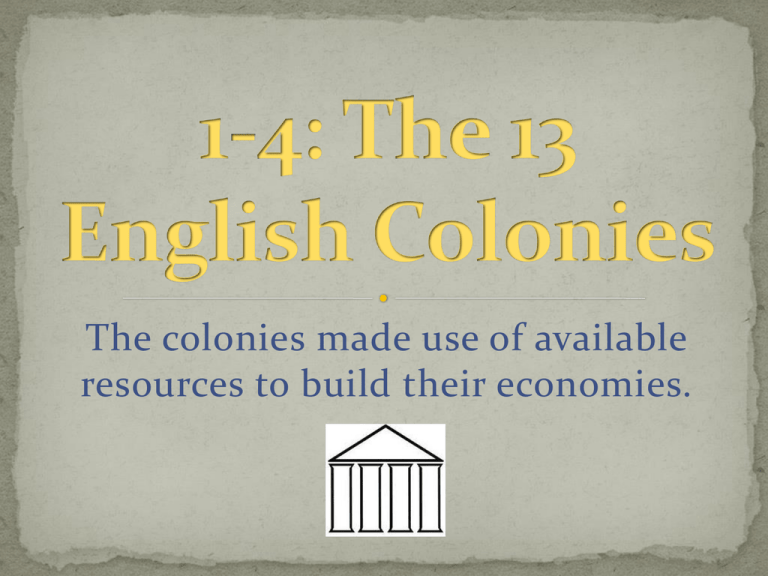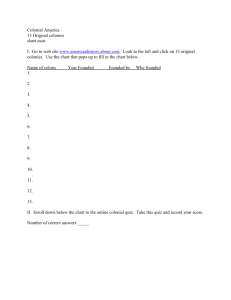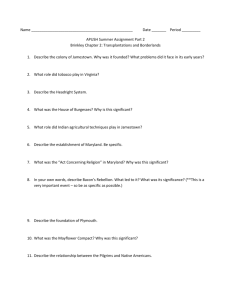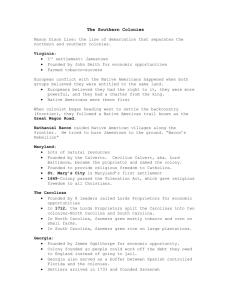Section 4
advertisement

The colonies made use of available resources to build their economies. The first successful English colonies were founded in Massachusetts (Plymouth) & Virginia (Jamestown) . Why do you think colonists continued to come to North America? Social Studies Standard 8.1: Students understand the major events preceding the founding of the nation and relate their significance to the development of American constitutional democracy. subsistence farming: a type of agriculture in which people live on what they grow themselves. cash crop: crops that are grown to be sold. debtor: an individual who owes something to another and/or cannot pay their own debts. The New England Colonies Founding: Massachusetts: Plymouth Colony founded in 1620 Massachusetts Bay Colony founded by the Puritans in 1630 (Both – religious freedom) Rhode Island: Founded in 1636 by Roger Williams (religious freedom) Connecticut: Founded by Thomas Hooker in 1636 (religious/political freedom) New Hampshire: Founded in 1622 by Ferdinando Gorges and John Mason (profit from trade and fishing) The New England Colonies Economy: New England had land that was difficult to farm, so people lived on what they grew themselves. New Englanders benefited from sea products and forest products. It became a center of shipbuilding and trade. The Middle Colonies Founding: New York: Renamed New York in 1664 after England took it over from the Dutch. Originally founded in 1624 (expand trade) Delaware: Founded in 1638 by Swedish settlers (expand trade) New Jersey: Founded in 1664 by John Berkeley and George Carteret (expand trade/religious and political freedom) Pennsylvania: Founded in 1682 by William Penn, a Quaker (profit from land sales/religious and political freedom) The Middle Colonies Economy: The Middle Colonies had land and weather that were suitable for large-scale farming on plantations. Many farmers produced cash crops. The people developed a wide variety of industries and crafts. New York and New Jersey were proprietary colonies. Land was granted to one or more owner. The Southern Colonies Founding: Virginia: Founded in 1607, at Jamestown, by John Smith (expand trade/farming) Maryland: Founded in 1634 by Lord Baltimore (profit from land sales/religious and political freedom) The Carolinas: Founded in 1663 by a group of eight proprietors. They were later divided into 2 states in 1712 and 1719 (expand trade/farming) Georgia: Founded in 1733 by James Oglethorpe (profit/home for debtors/buffer against Spanish Florida) The Southern Colonies Economy: The Southern Colonies had rich farmland near the coast where they produced rice and tobacco on huge plantations. Farther inland, along the Appalachian Mountains (backcountry), people cleared their own land and existed by growing their own crops instead of relying on slave labor. Plantation owners became dependent on slave labor. Tobacco Plantation Colonial Trade Trade Routes: A major route went up and down the Atlantic coast. Another route carried goods across the Atlantic to England. A third route, the triangular trade, linked the colonies to the Caribbean (West Indies) and Africa. Slaves were traded for sugar and molasses. Navigation Acts: The English Parliament began to pass Navigation Acts to regulate colonial trade. The acts benefited English manufacturers but not the colonies. List the New England Colonies. Massachusetts, Rhode Island, New Hampshire, Connecticut List the Middle Colonies. New York Delaware New Jersey Pennsylvania List the Southern Colonies. Virginia Maryland The Carolinas Georgia HOMEWORK EXTENSION Write a detailed SUMMARY of the section and complete the UNANSWERED QUESTIONS section of your notes. Choose two of the remaining Depth & Complexity ICONS in your notes and explain how they relate to this section.




